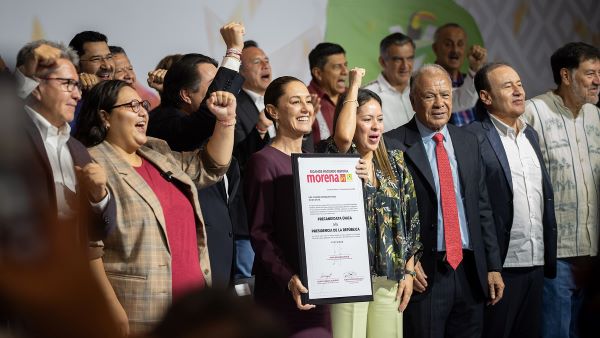
The crucial Mexican election has resulted in a landslide victory for Claudia Sheinbaum, standing for the populist Morena party. Morena was founded by the outgoing President Manuel López Obrador, popularly known as AMLO, in 2014. Sheinbaum won the Presidency with 59.5% of the vote and will become the first female president in the 200-year history of the country. Her nearest rival, also a woman, Xóchitl Gálvez, won only 27.6%. Gálvez was tarnished by the endorsement of her election campaign from all the other main pro-capitalist parties – she was seen as the candidate of the rich and powerful elite.
The election of the first female to the presidency is extremely significant in Mexico, a country riddled with violence and big elements of social disintegration. Over 1,000 women were murdered by their partners in 2021 (the country began to record “femicides” in 2014). Swaths of Mexico remain locked in war zones between drug cartels, paramilitaries and the army or police. Every year for the last five years over 30,000 people have been killed as a result of the war between various drug paramilitary organisations or the forces of the state – almost the total killed in Gaza!
Although the election of the first female president of Mexico is a historic event that will be widely welcomed, it is not the first time that a female candidate has won elections to the top public offices in Latin American countries, for example, in Brazil and Chile. For socialists, the key issue is what is Sheinbaum and Morena’s policies and programme and do they benefit the working class and poor?
Apart from the presidency, 98 million eligible voters were confronted with 70,000 candidates to fill the 20,000 posts that were up for election. Morena is set to win a two thirds majority in one or both houses of Congress. Having won the state of Yucatán, Morena now controls 24 of Mexico’s federal districts.
The social polarisation and elements of collapse were reflected during the lection campaign. This was the most violent election in the modern history of the country. Twenty five candidates were killed and another 25 election organisers or workers were also assassinated – the highest number killed were from Morena.
Sheinbaum was regarded as the “continuity” candidate following AMLO’s presidential terms. Morena and Sheinbaum are regarded by millions of voters as being in opposition to the corrupt, oligarchical capitalism that is linked to an array of political parties.
Yet neither AMLO nor Morena have a programme to challenge capitalism and replace it. AMLO ruled over a mixture of substantially increasing the presence of the military in a series of infrastructure projects and in other sectors of the economy. At the same time, he introduced austerity measures and continued participation in the USMCA (US Mexican Canadian Agreement), the successor to the hated free trade NAFTA agreement which benefited US imperialism. ALMO deployed the army in the fight against the drug paramilitaries but the military has been involved in drug trafficking and is riddled with corruption.
Mexico has enjoyed a small period of economic growth but with continuing rising levels of inequality and poverty. This has given rise to the formation of power drug cartels which, in effect, rule in some areas of the country.
Migration
All of these social issues will confront the Sheinbaum government, along with the crucial issue of migration. Millions pass through Mexico from central and southern America, as they attempt to enter the US. This issue will be crucial in the election in the US later this year and afterwards, leading to rising tensions between both governments.
The fragile growth of the Mexican economy has largely been fuelled by geo-political factors. Arising from the pandemic, the legacy of Trump’s trade war with China, the war in Ukraine, supply chain problems and other factors, some US companies have opted for more “near-shoring”. For the first time, in 2023, the US was buying more goods from Mexico than China, and Mexico became the US’s top trading partner. By 2023 13% of total US exports were to Mexico and 43% of exports from Mexico went to the US.
With a two thirds majority, Morena could move to change the constitution, in particular allowing for the popular election of the Supreme Court which has blocked a series of proposals AMLO attempted to introduce.
Despite the sweeping victory of Morena the new government will now confront all of the massive social, economic and political issues that exist. The attempts of reforming the system will not resolve any of these issues such is the depth of the crisis. Social and class struggles are certain to erupt, posing the need for the Mexican mass and working class to build a new political party that represents its interests with a revolutionary socialist programme to break with capitalism and mobilise the masses to confront the drug cartels. A struggle for such a party, with an appeal to join with the massive Latino working class and the working class, in general, and in the US, to jointly struggle to break with capitalism and imperialism and build a voluntary democratic socialist confederation of the Americas.

